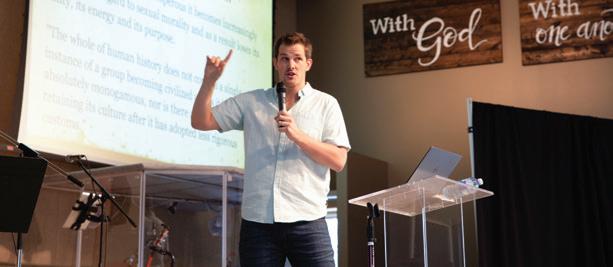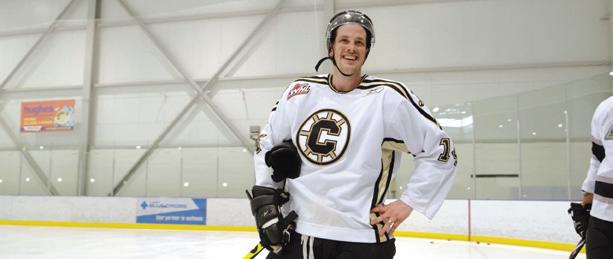
8 minute read
Giving Up The Dream
"It was a clean hit. He was a big boy. He was six-foot-seven, and I’m six foot-three. My head snapped back against the glass,” says Edmonton resident Matt Cline, recalling the concussion he received in October 2006 playing for the Chilliwack Bruins of the Western Hockey League. At eighteen, he was one of his team’s top players with a good shot at getting into the NHL.

Advertisement
At first, Cline figured he’d soon get back in the game. “It wasn’t one of those concussions where I was in the hospital and unconscious,” he says. “We thought I’d be out for maybe a week or two.” But when recurring headaches forced him to miss training camp the following year, he knew that his dreams of hockey greatness were over.
What he didn’t know was that God would use his injury to chart a very different course for his life.

Cline says the sting of missing the NHL was one that took a while to fade. “The hardest part for me was not being able to reach my potential. I always wondered how good I could have been. In those two years after I got hurt, I had a really hard time watching hockey because I’d be seeing guys that I had played with or against moving on to realize their potential, and I knew that I wouldn’t be able to. Whether I ended up playing pro or not, I just had a hard time not knowing what my peak potential was.”

“I knew nothing other than hockey at the time of my injury, but I did always trust God to lead me even when I had no clue what to do. After I got hurt, I opened my Bible randomly to Matthew 6 and read where it says, ‘Do not worry, for who of you by worrying will add a single hour to your life?’ This became my life verse, and it gave me peace beyond understanding.”
Today, Cline, who’s now thirty-two, heads up Restored, a Christian ministry he started that helps people overcome their addiction to pornography. Cline himself used to be a porn addict. He got hooked when he was only eleven and was well into his twenties before he finally got clean for good. Cline knows first-hand how easy it is to let porn get inside your head—and how hard it is to break free.
Due in large part to the explosion of social media, long gone are the days when boys would sneak a peek at Playboy centrefolds by flashlight under the covers. With online porn now just a few clicks away, the number of young children exposed to porn—and becoming addicted to it— has soared. And that includes many church-going Christians.

“We are looking at a sexually addicted, pornography-is-normal society,” Doug Weiss, the executive director at Heart to Heart Counseling Center in Colorado Springs, Colorado, told a Promise Keepers Canada podcast in 2017. “Look at the teen magazines, television. Look at the internet—huge pornography views. It’s become like just part of our culture, part of what we do.”
How bad is it? In a 2003 survey of porn consumption among children in Alberta, Edmonton sexual health consultant Sonya Thompson polled 425 students in Grade 8 across the province, as part of her research toward a master’s degree. Eightyeight percent of boys and seventytwo percent of girls said they had seen sexually explicit content online. And thirty-five percent of boys said they had seen porn too many times to count. That was seventeen years ago, and those percentages are probably a lot higher by now. But no one knows, because no further studies have been done on the subject since then, at least in Alberta.

“It’s just crazy to me that we don’t know what things look like now,” says Thompson. “This stuff is everywhere.”
Cline’s long journey toward victory over porn began about a year after being forced to hang up his skates. When he was twenty, he started some small businesses with the intent to become an entrepreneur. Then he had the idea of starting a ministry to combat porn in the church, once he’d become established in the business world. At twenty-one, Cline quit looking at porn. But that didn’t work out too well.
“What I held on to,” he says, “was that I wanted to be free from porn for when I dated a girl and got married. A few years later, I fell into porn again, and I was hooked really more than ever. It was such a struggle the second time.”

But now Cline was praying that the Lord would give him something stronger to hold on to that wouldn’t fail. “I also prayed that I wanted to be used by Him,” he says. “Then I was in a church service and the Lord said to me, ‘Matt, I can’t use you until you’re pure.’ I went, ‘That’s what I need to hold on to.’ I was twentyfive—and I’ve been free ever since.”
Shortly after, the Lord visited Cline again. “It was just before I was twenty-six,” he recalls. “I was in my room one night, and literally I felt the presence of God. He said, ‘I want you to start this ministry. I want you to help people get free from pornography and stay free forever.’ I said, ‘Now?’ And He said, ‘Yes. I want you to start it now.’ It was a powerful experience.”
And so was born Restored Ministries. But Cline admits that at first, he needed it as much for himself as for others. “I thought that because I had been called, obviously now I’m free, I’m good. But then temptations started coming back in my life,” he says. “Then I thought - I can’t hold on to this call to be my foundation. I had to start learning things like how to be thankful in a moment of temptation because I’m rooted in Christ. That’s the difference between the first time I got free and this time.” Restored’s programs include live events, workshops for parents, workshops for youth groups, one-on-one coaching, and an annual Victory Conference in Edmonton with another in Ottawa this year for the first time. Perhaps its most popular offering is an eight-session, online boot camp that more than 2,800 people globally have taken part in so far.
“The premise of it is to train yourself in godliness,” Cline says. “The first session is changing the neurology of your brain and rewiring and understanding the damage that’s been done, and how Scripture is a guidance in that. The second session is understanding your identity in Christ. That becomes kind of the theme throughout the whole rest of the boot camp because identity plays into everything. There’s a lot about understanding yourself and understanding why you do what you do, then finding healing and having a game plan moving forward so that then you can continue being free forever.”

A new program that Clines hopes to launch this spring is called Pure Freedom. “That’ll be a monthly subscription kind of thing,” he says. “There’ll be a hundred teaching videos, conference calls, and small groups. It’ll be really big.”
As much as it can, Restored tries to reach out to both men and women who are struggling. “A couple of years ago,” Cline says, “the biggest porn site said that a third of their searches came from women. We don’t think it, but it’s out there. When we do events, a lot of women come. Some come because their husbands are struggling, but a lot of them are really open. In their feedback forms, they’re talking to us about their addiction. We definitely see it a lot.”
The statistics back that up. A recent survey of Americans found that thirty-three percent of women aged 25-and-under searched for porn at least once per month. As well, eighty-seven percent of self-identified Christian women said they have watched porn. It also found that pornography use increases the marital infidelity rate by more than three-hundred percent.
Cline says while there is a lot of work to do—such as building a team of teachers and counselors to come alongside him—he believes Restored is on the cusp of helping potentially thousands of people craving freedom from a life controlled by pornography.
“The boot camp’s already gone around the world. But the new program, Pure Freedom, is going to be even bigger than that,” he says. “I see Restored as a tool that’s going to equip Christians and churches on how to deal with this issue. And I see that being something that can for sure be all over North America, if not globally.”
While giving up hockey was a painful sacrifice, Cline says those “what if?” moments while watching hockey highlights are fleeting in light of God’s plans.

To guys struggling with bitterness and their dream ending, he says to look back and thank God for the ride they went on in their sport. “Then I would encourage them to not be bitter at God for having a dream end, but draw close to Him knowing that if He really is good and your dream ended, imagine what more He has in store for you.”
To learn more about Restored Ministries, go to: restoredministries.ca
Check out Matt's story on ThisIsMeTV.com
/ FRANK STIRK is a journalist living in North Vancouver, BC. He is the author of Streams in the Negev: Stories of How God is Starting to Redeem Vancouver (Urban Loft).










